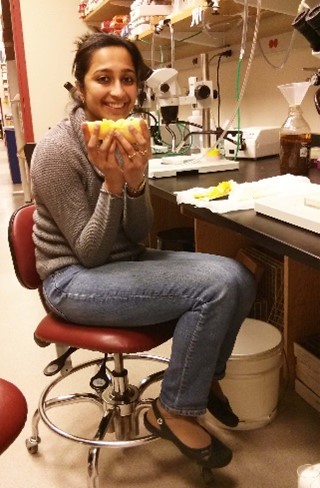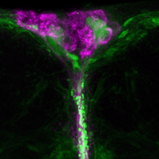 Dr. Akhila Rajan. Credit: Fred Hutchinson Cancer Research Center.
Dr. Akhila Rajan. Credit: Fred Hutchinson Cancer Research Center.
“What makes being a scientist exciting is that I don’t know what I’m going to find tomorrow,” says Akhila Rajan, Ph.D., an assistant professor in the basic sciences division at Fred Hutchinson Cancer Research Center in Seattle, Washington. Dr. Rajan is supported by an NIGMS early stage investigator Maximizing Investigators’ Research Award. These awards provide stable and flexible funding for a program of research that falls within NIGMS’ mission. Check out the highlights of our interview with Dr. Rajan to learn about her research and journey as a scientist.
Q: What’s your biggest accomplishment?
A: In terms of research, I would say it’s showing that the fat biology of the fruit fly has relevance to human biology, and that we can use this amazing research organism to study a complex physiological question. In terms of personal accomplishment, it’s being an immigrant coming from a household where neither of my parents went through traditional 4-year college training to now running my own research group. I hope my experience shows people that despite the barriers, there is a possibility to break through.
Q: What led you to study fruit flies (Drosophila)?
A: I had to choose a research organism for my master’s thesis, and Drosophila was the one I chose—mostly because it was available in a city close to my home. I didn’t think I was going to like it at all. But my mentor, Dr. Michael Bate, was a professor from the University of Cambridge who literally wrote two books on how to use Drosophila as a research organism. He wanted to make sure I became passionate about what I was doing, and his enthusiasm just rubbed off.

Q: What steps did you take after earning your master’s degree?
A: I applied to Ph.D. programs in the U.S., and I was fortunate to continue studying Drosophila and nervous system development in Dr. Hugo Bellen’s lab at Baylor College of Medicine. Then I did my postdoctoral fellowship in Dr. Norbert Perrimon’s lab at Harvard Medical School. There I found that flies’ fat cells communicate with the brain, which we didn’t realize, and that discovery led to what I study in my own lab at the Fred Hutchinson Cancer Research Center.
Q: What’s the focus of your lab?
A: One topic that my lab studies is how fat cells sense nutrient status—like a high sugar state or a starvation state—and how this, in turn, controls the production and secretion of a protein called Unpaired 2 (Upd2), which then conveys levels of fat storage to the brain. Upd2 in fruit flies is equivalent to a protein in humans called leptin, and we know that when leptin signaling goes awry, it can lead to obesity. But we don’t really know how the signaling works normally, so my lab is trying to better understand that.

A second project in my lab is studying how Upd2 reaches its target neurons in the brain. This is highly relevant for drug delivery because you want to ensure you get your molecules of interest into the central brain. We’re also looking at the connection between Upd2 and innate immunity—the body’s first line of defense against germs.
Q: What advice do you have for students interested in pursuing a career in science?
A: Embrace uncertainty. There’s always uncertainty associated with science—whether a project that you propose is going to take off, or whether you’re chosen for a certain job or get the grant that you applied for. Learning to embrace that uncertainty is an important skill.
Dr. Rajan’s research is supported by NIGMS grant R35GM124593.

